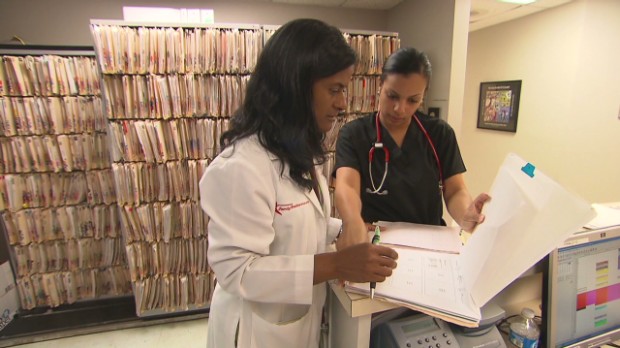NEW YORK (CNNMoney)
April 23, 2013
That's because relatively few people are familiar with provisions in the Affordable Care Act, aka "Obamacare," that will provide tax credits to low- and middle-income consumers to help them purchase health coverage through state-run insurance exchanges.
Most of those who will be able to claim the subsidies are in working families with annual earnings between $47,100 and $94,200, according to a recent analysis byFamilies USA, a consumer advocacy group. More than a third of those eligible will be young adults between ages 18 and 34.
Most of those who will be able to claim the subsidies are in working families with annual earnings between $47,100 and $94,200, according to a recent analysis byFamilies USA, a consumer advocacy group. More than a third of those eligible will be young adults between ages 18 and 34.
"There's a huge number of people who can get coverage this way and can get significant help," said Ron Pollack, executive director of Families USA. "It's not just for the poor. It reaches deeply into the middle class."
Here's how the subsidies will work:
Starting in October, those looking to buy individual health insurance can enroll in plans offered through state-based exchanges, with coverage beginning in January. Consumers buying individual plans will be able to choose between four levels of coverage: platinum, gold, silver and bronze. The plans will differ in their premiums and out-of-pocket expense burdens.
People who are not in a government health insurance program, such as Medicaid orMedicare, and do not have access to an affordable plan at work may be eligible for help paying their premiums. The assistance is available to those with incomes of up to four times the federal poverty level -- this year, that's $45,960 for an individual or $94,200 for a family of four -- and will be scaled to ensure that folks don't pay more than a designated percentage (the exact target varies by income level) of their earnings toward the premium. The subsidy will be paid directly to the insurance company.
The federal subsidies will be pegged to the cost of a "silver" plan, which will vary depending on where consumers live. Insurers will soon submit to the states and federal government details of the plans they'll offer in the exchanges, including the premium costs, but consumers may not learn the specifics until open enrollment starts in October.
Families USA crunched the numbers for a few different scenarios. By its estimates, a family of four earning $94,200 and purchasing a silver-level plan carrying a $12,500 annual premium will get a subsidy worth $3,550, which limits the cost of the premium to 9.5% of the family's income.
The government hasn't yet released its own estimates on how many Americans will be eligible for the subsidies, but Families USA believes that up to 26 million citizens will meet the criteria.
Not everyone eligible for those subsidies will actually sign up, though. The Congressional Budget Office is forecasting that only 6 million people will receive subsidized coverage through an exchange next year. It expects that number to grow to 22 million by 2017.
Many Americans are still in the dark about Obamacare provisions that could help them, said Matthew Buettgens, senior research analyst at the Urban Institute.
"Outreach is going to be crucial to creating viable exchanges in the early years," he said.
It will be a heavy lift. Only 62% of Americans are aware that subsidy assistance is available to individuals under the health reform law, according to a March Kaiser Family Foundation poll. And about two-thirds of the uninsured say they don't understand how Obamacare will affect them.
All Americans are required to carry health insurance as January 1, 2014, or face financial penalties, but if enrolling in coverage through the state exchanges is too expensive or too confusing, uninsured individuals might choose to skip it and pay the fines instead. That could lead to fewer healthy people enrolling -- which would make coverage in the exchanges more costly for everyone, since they would become populated primarily by people with greater medical needs.

No comments:
Post a Comment